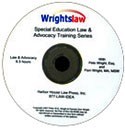| October 21, 2008
ISSN: 1538-3202
Issue: 458
Subscribers: 65,267 | |
In This Issue: |
| Using Programs that are Not Interchangeable
Wilson Assessment of Coding & Decoding (WADE)
The Report on Step & Sub-Step Mastery
The Importance of Progress Monitoring & Reports
More Reading Resources
Live Debate Tonight!
Education & the Next President
|
Blog The Wrightslaw Way
A Special Online Community

Featured Products
Is your child having difficulty learning to read?
What is reading?
Find the federal legal definition of reading,
p. 56
Get your own copy of No Child Left Behind, includes CD-ROM
Wrightslaw: No Child Left Behind

To order
Wrightslaw: Special Education Law, 2nd Edition
Eligibility & Reading Fluency Skills, p. 243

To order
Special Education Law & Advocacy Training
(6.5 hrs)

To order
Wrightslaw Training
Get Help!
Looking for an advocate, attorney, evaluator, consultant?
Check the
Yellow Pages for Kids with Disabilities

|
|
|
| Contact Info
Pete and Pam Wright
Wrightslaw & The Special Ed Advocate
P. O. Box 1008
Deltaville, VA 23043 |
|
 |
Website |
|
 |
|
| |
|
| Copyright
© 2008, Peter W. D. Wright and Pamela Darr Wright. All rights reserved. Please
do NOT reprint or host on your web site without explicit permission. |
|
We've published a series of articles about reading and how essential a good reading program is for preventing reading failure. If you have not seen progress in reading, you may need to consider a remedial program for your child.
You've read about the importance of research based programs used with young children to foster early literacy.
If your child is making documented progress in a reading program, why would you want to switch programs?
Here's an unusual question we wanted to share.
"I am trying to find research on the appropriateness of switching from one research based reading program to another.
My daughter has made huge progress (proven by recent testing) in an Orton-Gillingham / MTA program and now the school district is trying to switch her into the Wilson program.
Why would they switch when progress is being made?"
In this issue of the Special Ed Advocate, Sue Whitney, Research Editor at Wrightslaw, discusses the puzzling question of switching from one reading program to another and how making the change will require starting at a lower level
in order to fill in gaps.
Please don't hesitate to forward this issue to other families, friends, and colleagues.

Sign up free today! l Read previous issues |
|
Using Programs That are NOT Interchangeable |
Proven programs that are research based are the best programs to use for teaching reading.
However, some programs are
not interchangeable.
The MTA program (Multisensory Teaching Approach) and the Wilson program do not teach skills in the same sequence.
Therefore,
switching from one program to another will require starting at a lower level
in order to fill in gaps.
If your school is proposing a change to the Wilson program when the MTA program has been so successful with your child, you need to get more information on why the district wants to change.
|
back to the top |
|
Wilson Assessment of Coding and Decoding (WADE) |
The Wilson program consists of 12 Steps. Progress in Wilson
will (should) be tracked with the Wilson Assessment of Decoding and Encoding
(WADE) and by a post-test at the end of every Step.
The Wilson program
instructions say that the WADE
"should be administered prior to instruction in the Wilson
Reading System. It can be used for pre and post-testing purposes as well as
placement and pacing guides for the Wilson Reading System."
After the WADE
is administered the scores on the various parts are summarized in the "WADE
- Summary of Scores" and the "Mastery Report".
The WADE also contains a "Report of Wilson Instruction" and a "Skills
Report".
|
back to the top |
|
| The Report on Step and Sub-Step Mastery |
|
The Report of Wilson Instruction reports the Step and Sub-step the
student is on and the percent of mastery of
The Skills Report rates 23 skills related to
- Vocabulary and Comprehension,
- Oral Reading,
- Handwriting/Writing Skills, and
- Other skills (alphabetic sequencing, independent phonemic
segmentation, independent syllable division, ability to follow directions,
self-reliance, attention-directed lesson, attention-independent work, and
word retrieval) on a 1 to 5 scale, 1 being poor and 5 being excellent.
|
back to the top |
|
| The Importance of Progress Monitoring and Reports |
Ask for reports
when your child starts the Wilson program and each time the WADE is
administered for progress monitoring.
The post-test at the end of each Step covers Reading, Concepts, and Spelling.
These assessments can show growth over short periods of time. Other assessments may not be sensitive enough to do that for all the components of reading. Just looking at fluency or comprehension is not enough.
Find out more about Progress Monitoring. |
back to the top |
|
More Reading Resources |
Reading at Wrightslaw
Read these articles in the series, Doing Your Homework, by Sue Whitney, Research Editor at Wrightslaw.
Why Use Research Based Reading Programs?
How Can I Get a Trained Certified Reading Teacher?
Research-Based Reading Instruction
Reading Fluency - How Can I Get a Program That Works?
Printer friendly copy of Sue's new article, My Child is Making Progress - WHY Would the School Switch Reading Programs? |
|
back to the top |
|
Live Debate Tonight! |
The live debate tonight is being exclusively Webcast by edweek.org with generous support from NASSP.
Live from Teachers College, Columbia University: "Education and the Next President," a debate between Linda Darling-Hammond, education adviser to Democratic nominee Barack Obama, and Lisa Graham Keegan, education adviser to Republican nominee John McCain.
Exclusive webcast, Tuesday, October 21, 7 p.m. to 8:30 p.m. Eastern time
Register now to watch the live debate.
A video archive of the debate will be posted here on Oct. 22 by 12 p.m. Eastern time.
Analyzing the Election: What’s at Stake for Schools?
Available online Wednesday, Oct. 22, 12 p.m. Eastern time
Education Week’s David J. Hoff moderates a post-debate discussion with leading education analysts.
|
|
back to the top
|
|
|







